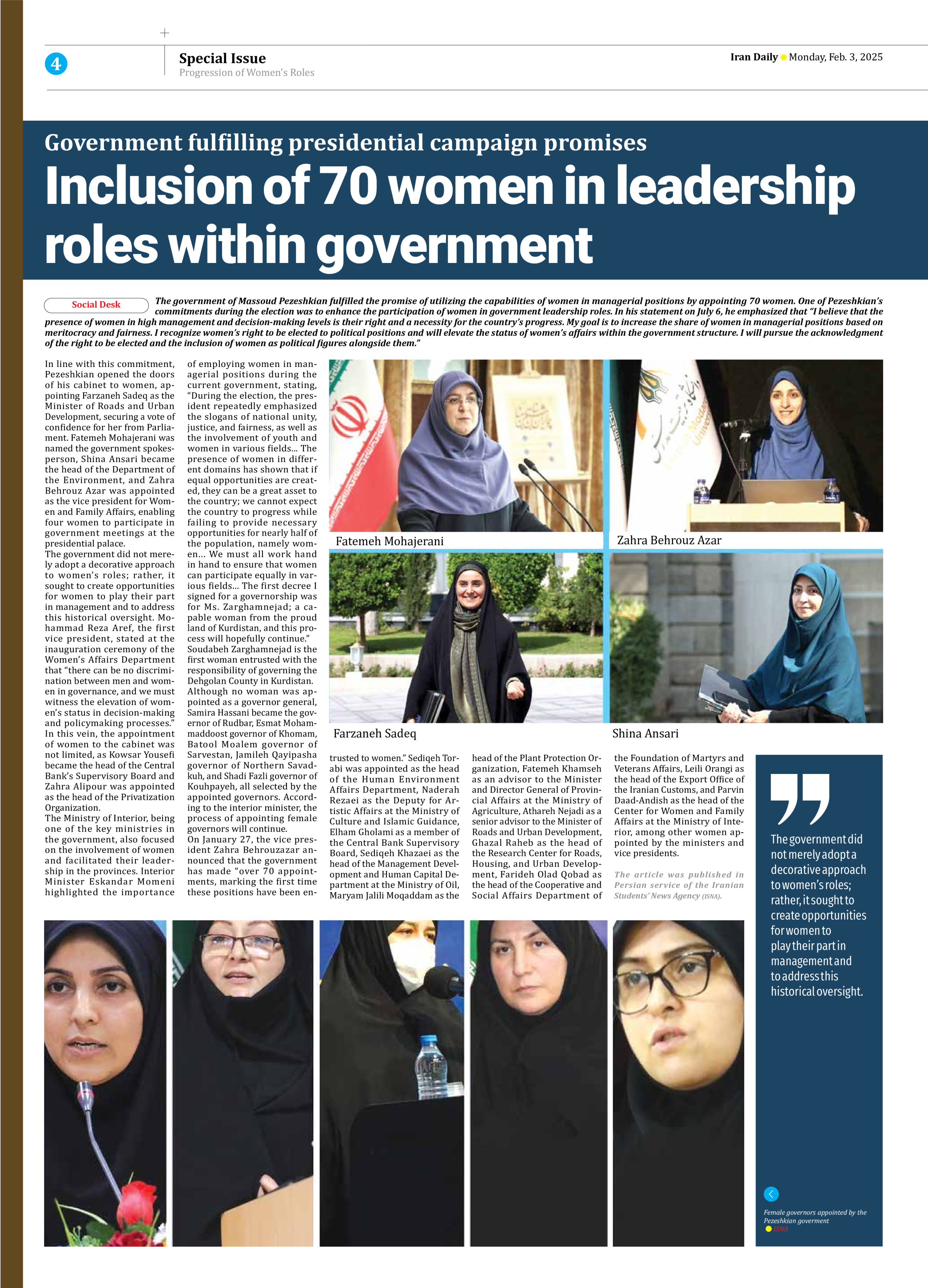
Government fulfilling presidential campaign promises
Inclusion of 70 women in leadership roles within government
The government of Massoud Pezeshkian fulfilled the promise of utilizing the capabilities of women in managerial positions by appointing 70 women. One of Pezeshkian’s commitments during the election was to enhance the participation of women in government leadership roles. In his statement on July 6, he emphasized that “I believe that the presence of women in high management and decision-making levels is their right and a necessity for the country’s progress. My goal is to increase the share of women in managerial positions based on meritocracy and fairness. I recognize women’s right to be elected to political positions and will elevate the status of women’s affairs within the government structure. I will pursue the acknowledgment of the right to be elected and the inclusion of women as political figures alongside them.”
In line with this commitment, Pezeshkian opened the doors of his cabinet to women, appointing Farzaneh Sadeq as the Minister of Roads and Urban Development, securing a vote of confidence for her from Parliament. Fatemeh Mohajerani was named the government spokesperson, Shina Ansari became the head of the Department of the Environment, and Zahra Behrouz Azar was appointed as the vice president for Women and Family Affairs, enabling four women to participate in government meetings at the presidential palace.
The government did not merely adopt a decorative approach to women’s roles; rather, it sought to create opportunities for women to play their part in management and to address this historical oversight. Mohammad Reza Aref, the first vice president, stated at the inauguration ceremony of the Women’s Affairs Department that “there can be no discrimination between men and women in governance, and we must witness the elevation of women’s status in decision-making and policymaking processes.” In this vein, the appointment of women to the cabinet was not limited, as Kowsar Yousefi became the head of the Central Bank’s Supervisory Board and Zahra Alipour was appointed as the head of the Privatization Organization.
The Ministry of Interior, being one of the key ministries in the government, also focused on the involvement of women and facilitated their leadership in the provinces. Interior Minister Eskandar Momeni highlighted the importance of employing women in managerial positions during the current government, stating, “During the election, the president repeatedly emphasized the slogans of national unity, justice, and fairness, as well as the involvement of youth and women in various fields... The presence of women in different domains has shown that if equal opportunities are created, they can be a great asset to the country; we cannot expect the country to progress while failing to provide necessary opportunities for nearly half of the population, namely women... We must all work hand in hand to ensure that women can participate equally in various fields... The first decree I signed for a governorship was for Ms. Zarghamnejad; a capable woman from the proud land of Kurdistan, and this process will hopefully continue.”
Soudabeh Zarghamnejad is the first woman entrusted with the responsibility of governing the Dehgolan County in Kurdistan.
Although no woman was appointed as a governor general, Samira Hassani became the governor of Rudbar, Esmat Mohammaddoost governor of Khomam, Batool Moalem governor of Sarvestan, Jamileh Qayipasha governor of Northern Savadkuh, and Shadi Fazli governor of Kouhpayeh, all selected by the appointed governors. According to the interior minister, the process of appointing female governors will continue.
On January 27, the vice president Zahra Behrouzazar announced that the government has made “over 70 appointments, marking the first time these positions have been entrusted to women.” Sediqeh Torabi was appointed as the head of the Human Environment Affairs Department, Naderah Rezaei as the Deputy for Artistic Affairs at the Ministry of Culture and Islamic Guidance, Elham Gholami as a member of the Central Bank Supervisory Board, Sediqeh Khazaei as the head of the Management Development and Human Capital Department at the Ministry of Oil, Maryam Jalili Moqaddam as the head of the Plant Protection Organization, Fatemeh Khamseh as an advisor to the Minister and Director General of Provincial Affairs at the Ministry of Agriculture, Athareh Nejadi as a senior advisor to the Minister of Roads and Urban Development, Ghazal Raheb as the head of the Research Center for Roads, Housing, and Urban Development, Farideh Olad Qobad as the head of the Cooperative and Social Affairs Department of the Foundation of Martyrs and Veterans Affairs, Leili Orangi as the head of the Export Office of the Iranian Customs, and Parvin Daad-Andish as the head of the Center for Women and Family Affairs at the Ministry of Interior, among other women appointed by the ministers and vice presidents.
The article was published in
Persian service of the Iranian
Students’ News Agency (ISNA).







